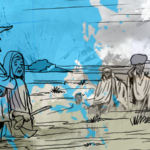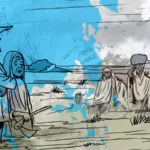
The call connected us across the distance. His voice, heavy with frustration and loss, filled the silence. “The floodwaters washed away almost all the crops,” Modu Alhaji Bukar began, pausing briefly as if the weight of his words needed space to settle. “It came at night, just a month after I planted the land.” There was a slight crack in his voice, but he continued.
For a moment, I imagined the scene—seven hectares of rented land in Muna, a community in the Jere area of Borno state, once brimming with the promise of sorghum, beans, and groundnuts, now a field submerged, suffocated beneath the weight of muddy water. Like so many others in the region, Modu’s land had become another casualty in a place already battling hunger, conflict, and an unrelenting climate crisis.
“I feel saddened by this disaster,” Modu admitted. “But it is a general problem.” The flood had not only swallowed his field whole but also claimed both his houses, forcing him, his two wives, and their nine children to live with a relative. For days, they were left without shelter. “We could not save anything. It will take time before I can recover,” he said.
Modu’s story is not an isolated one. His fellow farmer, Aja Bukar Auno, shares a similar experience of struggle and survival.
“There is so much hunger this year. Food is very expensive,” Aja lamented. His farm in Auno, covering over 16 hectares, is larger than most. However, drought has etched its scars deeply into the land. This year, he could only cultivate half. Though less severe than in previous years, the drought had drained his crops. “We could barely purchase what to eat,” he said.
“The market prices change almost every day,” Modu added, echoing Aja’s frustrations. The little relief that might have come from the government or aid organisations seemed distant. Modu’s voice grew quieter when asked about aid. “I have heard it on the news,” he said, “but it has not reached us.”
Caught between crises
Northeastern Nigeria has long been a landscape haunted by conflict. For more than a decade, the Boko Haram terror group has ravaged the region, particularly Borno, Adamawa, and Yobe states, displacing millions and turning farmlands into battlegrounds. “We could not farm when the insurgency was at its peak,” Modu told HumAngle. The insecurity has kept him, and many like him, away from farming for many years, stifling local food production.
Even as some security returns, vast areas remain inaccessible. According to Aja, “You cannot go deep into the bush. You may get kidnapped or killed. In fact, so many of my friends could not farm because their lands are on the extreme outskirts of the town.”
Climate change has emerged as an additional foe in moments of fragile peace—unseen but unforgiving. Prolonged droughts have dried up water sources, while flash floods, like the one that drowned Modu’s crops, continue to wreak havoc on communities, washing away any progress before it has a chance to take root.
“We tried,” Modu said, his voice tinged with resignation. “We tried to return to the fields after the conflict, but now… now, the floods have taken everything.” An investment of more than ₦277,000 ($170) in seeds, ploughing, and cultivation—completely washed away. “When the water dries,” he added, “I intend to replant the sorghum.” His voice softened as if hope had to be whispered.
“I have another farm at Auno,” Modu said with a note of cautious optimism. “That one is safe.” Still, even this hope felt fragile. “The harvest is not promising. The crops, especially the sorghum, are still short. They are yet to pollinate. It has been about two months now since I planted them.” The challenges of limited access to seeds, tools, and modern farming techniques loomed over what little remained of his confidence.
The human cost
The human toll of this crisis is sharpest on the most vulnerable: women and children.
“Farming is our sole means of livelihood,” Hakuri Yusuf, a displaced farmer in Maiduguri, shared. “We rely heavily on the season’s harvest until the next one. Unfortunately, sometimes, our supplies run out before the next harvest arrives. In such instances, we depend on assistance from relatives and friends. And if no help comes, we may go days without food.” Hakuri’s husband had abandoned her, leaving her to fend for their three children alone.
Karu Modu, another displaced mother of five from Bama, echoed these struggles. “We gather firewood from the bush and sell eight pieces for ₦100 [$0.06],” she explained. “It is barely enough to buy a measure of maize flour.” The fear of running into terrorists while collecting firewood often left them trapped between hunger and danger.“They snatch any valuables we have, including clothing, food, and footwear. On days we cannot go to the bush, we sleep hungry.”
For a moment, I imagined the hunger—how it felt, gnawing and constant. “It’s even worse now,” Karu continued. “It has gotten to the point where we feed on unknown vines and tree leaves, which have now finished because of constant gathering.”
The situation is particularly dire for children. The United Nations Office for the Coordination of Humanitarian Affairs (OCHA) has warned that in 2024, over 230,000 children under the age of five in Borno, Adamawa, and Yobe states are at risk of life-threatening conditions unless they receive immediate treatment for acute malnutrition and other critical nutritional support. Additionally, OCHA projects that 4.8 million people across these states are likely to face severe food insecurity, with nearly half a million on the brink of catastrophic hunger.
Among those most brutal hit are children like Rabiatu Jibrilla’s two-year-old son. He is one of the many being treated for severe malnutrition at a facility supported by the International Committee of the Red Cross (ICRC) in Mubi, Adamawa state. “When I brought him here, he couldn’t even sit on his own,” Rabiatu said. “His stomach was so flat as if he had no intestines.”
The intersection of displacement, lack of access to nutritious food, and the destruction of local food systems has created a public health crisis, with malnutrition threatening the survival of countless children.
International aid organisations like Médecins Sans Frontières (MSF) and the ICRC are battling to stem the tide, but resources are stretched thin. In April 2024, MSF’s medical team in Maiduguri admitted 1,250 severely malnourished children with complications—double the number recorded for the same month in 2023. This surge has forced MSF to increase its capacity from 200 beds to 350. In Bauchi, the situation is even more dire, with a 188 per cent increase in admissions of severely malnourished children between January and March this year compared to the same period in 2023.
“We are trying to strengthen our support, but the needs are far beyond what we can achieve,” said Francesca Piccin, head of the ICRC sub-delegation in Mubi. She highlighted the organisation’s efforts to remind conflict parties of their obligations under international humanitarian law, stressing the importance of ensuring access to essential survival needs and humanitarian aid.
On the ground, the situation grows more desperate by the day. Overcrowded medical facilities force staff to treat children on mattresses laid across the floor. “Children are dying,” said Dr Simba Tirima, MSF’s Nigeria Country Representative. “If immediate action is not taken, more lives will hang in the balance. Everyone must step in to save lives and give northern Nigeria’s children a chance to grow, free from malnutrition and its devastating consequences.”
The path forward
There are no easy answers. The crisis in North East Nigeria is as deep as it is wide. However, experts like Bala Gabriel, Executive Director of Concern for Climate Change for the Community Initiative (FOURCi), agree that investments in climate-resilient farming and stronger infrastructure are vital.
“It is one of the surest ways to ensure food security. You cannot predict when rainfall will come in wet farming. So, the government needs to support farmers in starting up irrigation and dry season farming,” he recommended. Building more robust irrigation systems, providing farmers with drought-resistant seeds, and supporting local food production are all critical strategies for mitigating the impact of climate change on food security in the region.
In addition, addressing the root causes of the insurgency—poverty, lack of education, and poor governance—could help stabilise the region and allow displaced families to return home. For now, international aid organisations remain the last line of defence against a worsening humanitarian disaster. However, without sustained financial and logistical support, their efforts may only offer temporary relief in a crisis that shows no sign of abating.
The future is uncertain for Aja, Modu, and millions of others in northeastern Nigeria. As the rains fall and the floods recede, they are left to pick up the pieces of their shattered lives.
“We need help from the government,” Modu pleaded. “We would appreciate it if we could receive crops, fertilisers, modern farming tools, cash grants, or even some training. We have once been promised fertilisers and irrigation farming tools. They gave us forms to fill out about seven months ago. We are yet to get anything.”
